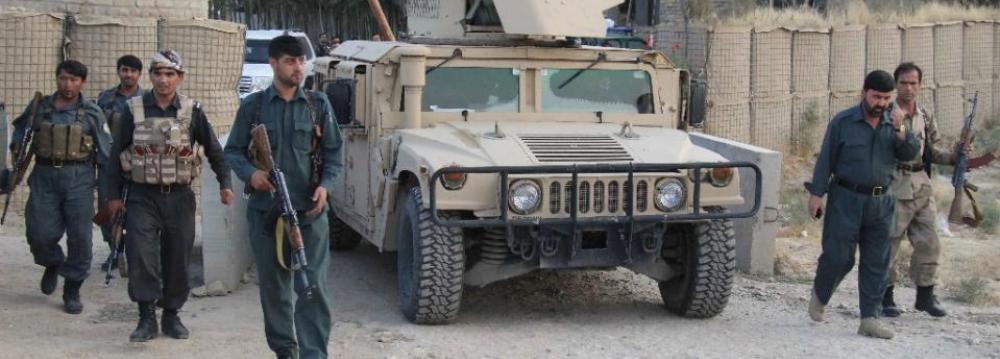NATO said Wednesday its special forces were supporting Afghan troops in Kunduz after Taliban insurgents seized the city, fought off a counter-attack and advanced on the airport to shore up their biggest victory in 14 years.
Heavy fighting was underway near the northern city’s airport where government forces retreated, highlighting the potent challenge the militants pose after their lightning capture of Kunduz, AFP reported.
The Taliban’s occupation–now in its third day–raises troubling questions about the capabilities of Afghan forces as they battle the militants largely on their own after NATO’s combat mission ended last December.
The Afghan Army was supposed to be bolstered by its own reinforcements for the campaign to retake Kunduz, but attacks on convoys making their way to the city meant that backup troops were only trickling in.
“The Taliban have laid landmines and booby traps around Kunduz, slowing the movement of convoys of Afghan Army reinforcements driving to the city,” an Afghan security said.
NATO said the foreign special forces have reached Kunduz and US forces have conducted three airstrikes around the city since Tuesday to support the Afghan troops.
The fall of the provincial capital, which sent thousands of panicked residents fleeing, has dealt a major blow to the Afghan military and highlighted the insurgency’s potential to expand beyond its rural strongholds.
The Afghan security official said the militants had slowly infiltrated Kunduz during the recent Eid festival, launching a Trojan horse attack that enabled them to capture it within hours.
Expanding Insurgency
The Taliban’s recent gains in Kunduz and neighboring provinces highlight a rapidly expanding insurgency as militants infiltrate into the north from their traditional southern strongholds.
Kunduz province, which borders Tajikistan and is a major transport hub for the north of the country, could offer the Taliban an important new base of operations.
Kunduz’s fall has also renewed questions about Washington’s plan to withdraw most US troops from Afghanistan next year.
Even after years of training and equipment purchases–on which Washington spent a whopping $65 billion–Afghan police and troops have been unable to rein in the ascendant insurgency.
Despite the counter-attack Kunduz remained largely under Taliban control–the first major urban center in their grip since they were toppled from national power in 2001.
Insurgents showed off seized tanks and armored cars, chanting “Allahu Akbar” (God is greatest) and promising to enforce their version of Sharia law, a Taliban video showed.
Scared of Leaving Homes
The defense ministry said the police headquarters and city prison had been retaken, after marauding insurgents freed hundreds of prisoners, including some Taliban commanders.
Precise losses in the fighting were not known, but the Afghan Health Ministry said hospitals in Kunduz had so far received 30 bodies and more than 200 wounded.
The United Nations said the fighting has forced up to 6,000 civilians to flee the city.
Amnesty International said the Taliban were exposing civilians to grave danger by “hiding in people’s houses and conducting door-to-door searches for Afghan security personnel or government staff”.
“We are scared of leaving our homes, scared of being beaten by the Taliban,” said Sadiqa Sherza, head of Roshani Radio, a Kunduz media network focused on women’s issues.
“There’s no electricity, no water, and ration shops are all closed,” she said, adding that insurgents had burned down the radio station.


